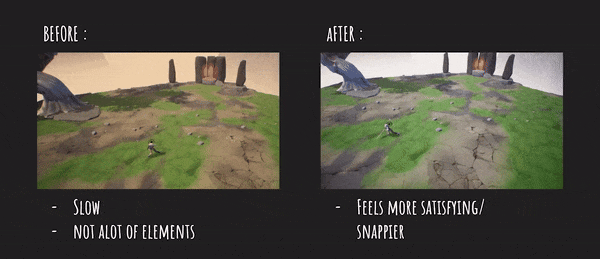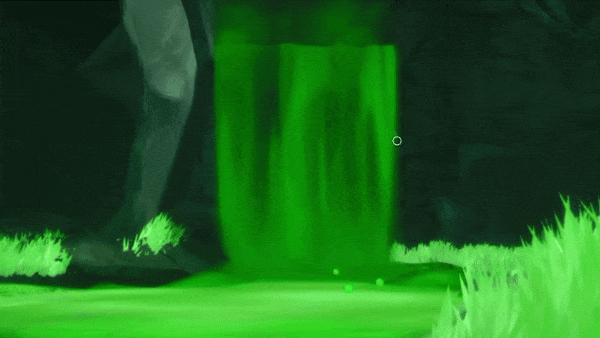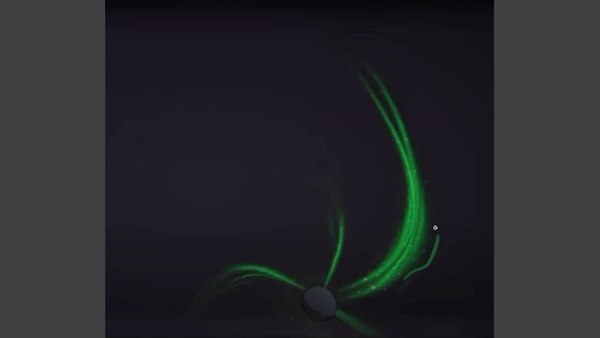Feedback: How to Get (and Give) What You Need
Dec 04, 2024
Feedback is an invaluable part of learning anything, especially when you are working on creating something as part of a group like creating VFX for games. At the same time, it can sometimes be the most stressful part of the creative process.
You might ask yourself, what does their feedback say about me? If they give you a long list of feedback, it can be overwhelming and you might feel like you are failing at your goals. But feedback when it is done well, is all about helping you grow and improve at what you are working on. Let’s look at the process of getting (and giving) feedback, and how we can make it work to help us succeed!
Paintover from the Free Portfolio Review session done by Jason Keyser, VFX by Harry Johnston
Feedback can be intimidating
Asking for feedback, especially when it comes to art, can be a stressful experience. When you put a lot of work and passion into something, it is easy to feel like you are putting yourself in a vulnerable position. What if someone hates it? What if other people’s art looks better than mine? What if I’m not good enough?

Feedback from Area of Effect VFX — Apprenticeship with Kristy Doan, VFX by Rowan Rees
If you feel yourself having these thoughts, take a moment to pause. Take a deep breath. It is important to recognize your own feelings, before and while getting feedback. If you are feeling defensive, you might be less open to listening and remembering the feedback you are getting. An important tip is to take notes during feedback as it allows you to revisit things. Even if you are apprehensive, write what you hear down. You can then take some time to distance yourself emotionally, and review the feedback when you feel you can take it more objectively.
Having a group space where you can exchange feedback can also help! This is why we at VFX-A work towards building a close environment with our students over at our private Discord server. Sharing your work can be easier when others are sharing as well, when you are encouraged and guided through the process of giving and receiving feedback no matter what level of experience you have.
Feedback is important for growth
Part of what will help you get through any discomfort you might have sharing or communicating about your work, is to remember why feedback is important at all. In a production environment, feedback’s purpose is all about guiding you and the effects you create towards the goal of fulfilling the needs of a game. You have timing, satisfaction, and visual storytelling you need to build into your effect, and that all needs to work cohesively with the work done by other teams. If you are working on effects more independently, then it can be more difficult, as you have to be the one to guide yourself and determine when and where to ask for help.

Paintover from the VFX Paintover Series by Kees Klop, VFX by Lee "Zeph" Parks
As Jason talks about working with feedback, a good time to ask for one is when you do not know what it is that your art needs. Sometimes this might mean you have finished your effect (congratulations!) and there is nothing more you really need to do in order to fulfill the goals you had in mind. Other times it can simply mean that you have focused for so long on a project that it is hard to see how your effect looks to another person. It is very common for intention and impact to be different, so it is good to get outside perspectives when you can!
But you don’t have to be out of ideas to ask for feedback either! Knowing that there is an issue or something you want to improve in your effect can be a huge boon for feedback because the person you ask can narrow their focus. Whether you have ideas on how to solve a problem you are having or have no idea where to start, make sure to communicate these things to the person you want feedback from. Clear communication can go a long way towards making your feedback session a more helpful experience.
Have goals in mind
One way to help yourself get productive feedback is to outline goals for what it is that you want to get out of the process. Is there a specific part of your effect that you are struggling with? Are you looking for suggestions on how to solve a particular problem, or are you unsure what you need to improve? If you can come to a person (or VFX-A’s community Discord!) with a clear idea of what kind of feedback you are looking for, it can help them better know what they can offer to help you.

Feedback from Area of Effect VFX — Apprenticeship with Kristy Doan, VFX by Rowan Rees
The more specific you can be in your goals, the more direct you can be with the person giving you feedback (see Q+A video). It can be easy for someone to just try to list everything they can think of that you might want to improve without being given guidelines as to what you are looking for. Large amounts of feedback at once like that can just end up leaving you feel overwhelmed and unsure of where to start addressing it as a result.
It is important to be honest about your goals when you want to get feedback. In Thanks for the Feedback by Douglas Stone and Sheila Heen, they talk about how there are two kinds of “mirrors” that feedback givers can be, honest or supportive. Ideally, the person giving you feedback can give you a combination, but it can help to figure out what it is that you want as well. Do you want brutal honesty, or a kinder supportive kind of feedback? Both have their merits!
You control your reaction
Once you have feedback, it is up to you how you respond. If you are feeling negatively, try to take a moment to look deeper at those feelings. Are they about your sense of self? Are they about your relationship with the person who gave you feedback? Feedback should never be about you as a person, so if it feels personal, it is important to evaluate that.

Feedback from Area of Effect VFX — Apprenticeship with Kristy Doan, VFX by Rowan Rees
Sometimes you do get bad feedback; maybe you got a mean-spirited comment on your social media post, or your reviewer honed in on a different part of your effect than the one you wanted help with. Look at your work, and look at their feedback. If you genuinely feel that the notes are not constructive and will not help you improve, then it is time to look for feedback elsewhere.
Then you can look at the notes you feel are constructive. What suggestions or notes align with the goals that you have? As with any large project, if you have multiple notes, pick one that you feel like you can work on and start there. Once you think you have hit a stopping point again, consider asking for more feedback. Sometimes you hit the end of an effect, and it is more productive for you to move on to a new one. It’s all about determining what makes sense for you personally.
What about giving feedback?
Being able to give good feedback is just as important as being able to get it! Consider the suggestions for giving feedback, and consider asking those questions yourself. Does the person requesting feedback want specific guidance? If they are planning on moving on to a new effect, you may want to consider giving them broader feedback that they can apply to an entirely different effect!

Paintover from the Beginner Bootcamp live review done by Jason Keyser, VFX by Jack Mitchell
Where do I start?
Consent! You might have experience with it if you have posted any art on the internet, but getting unsolicited feedback is an unpleasant experience. Giving unsolicited feedback is perhaps the quickest way to shut down communication with another person. If you come across a piece of art and a great suggestion comes to mind, just ask them if they are open to feedback. If they are, then great! You can go ahead and share your knowledge with them. If they are not open to feedback, then it is best to walk away; you will save yourself time avoiding trying to solve other people’s problems.

Paintover from the VFX Paintover Series by Kees Klop, VFX by Sandra Femeńia
Just like getting good feedback, the best place to start (after consent) is to define goals. Are there goals for the project that are not the same as the goals of the artist? What level of feedback are you open to giving? If you are the kind of person who loves to do paintovers or make tutorials, feel free to let people know! Just the same, there is nothing wrong with making it clear that you are only available for feedback and not more in-depth assistance. Setting clear boundaries will make it easier for you and the person you are giving feedback to have clearer expectations.
A gentle hand
When you are actually giving your feedback, remember what it was like when you opened yourself up for feedback. Acknowledge that it might be difficult for them to offer their art up for critique, and keep in mind that you want to give your feedback from a genuine, helpful place. One tip that can help is to start from a place of encouragement and support. Begin your feedback with praise for the things that are working, then move on to the areas that need improvement.

Paintover from the Free Portfolio Review session done by Jason Keyser, VFX by Dante Zieher
Look at the goals, either ones you have set or ones that were communicated to you, and be specific with your feedback. Prioritize the things that will be most helpful to achieve those goals. If there are things that you know how to do and you believe you can offer them, give suggestions. It can be easy to simply point out areas that are problems, but that can sometimes feel more negative. Being able to suggest solutions, even in broad ways like “you might want to use a sphere mesh here,” can help lead them in the right direction without being as hands-on as say giving someone a screenshot of a shader setup.
If you do give feedback but get a negative response, try not to take it personally. Be mindful that it is up to the artist whether or not they choose to implement your feedback; you can offer suggestions and options, but ultimately in a casual environment, the artist has final say. You should avoid making declarative statements of how something “should” be done, which can come across as demanding.

Feedback from Area of Effect VFX — Apprenticeship with Kristy Doan, VFX by Rowan Rees
An outside perspective
When you are struggling, it is a good idea to ask for help. If the help you get is not the help you need, try to communicate more directly what your needs are, and if necessary, seek feedback elsewhere. If you see someone struggling, consider offering feedback of your own. Even giving feedback and seeing it fail can be a learning experience! At the end of the day, feedback is all about sharing knowledge so that we can all improve.

You can use this cheat sheet from Peet Cooper to help you remember some of the major tips for getting and giving good feedback!
Start Your VFX Apprenticeship
Begin your journey towards mastering FX for games and animation. Join VFX-A All Access and discover cutting-edge 2D, 3D, and real-time FX training.









